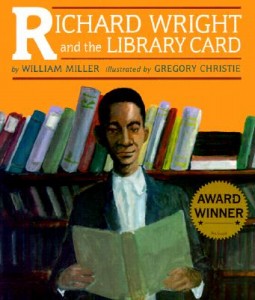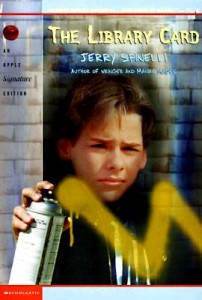In many families this is an interesting question! Getting a library card is often seen as an important milestone in a child’s life. And so it should be. It is a symbol of independence–I get to pick out the books I want to read and take them home–and trust–a library card is like a credit card, providing access to valuable resources. For some children, the age for getting a library card is set in library policies. Some libraries set a minimum age, preferring that children under that age use their parent’s card. Other libraries require that the child be able to write his or her own name as an indication that the child has some understanding of the responsibility that comes with having a library card. More and more libraries today leave the decision up to the parents, allowing them to determine when it will be meaningful to their child.
Regardless of the child’s age, getting a library card is an important “rite of passage.” It focuses the child’s attention on the importance of reading, a challenge in a world filled with media, technology, and entertainment distractions. A library card gives a child a real sense of ownership in the library and an investment in reading. Children exhibit a real sense of pride when they can say they have “my own library card.” A library card also helps a child learn responsibility. Establish guidelines for library borrowing. How many books or other items can be borrowed at one time? Where are library books kept at home when they are not being used? If the library charges fines for overdue books, does the child pay if he or she forgets to return the items on time?
By the time a child enters school, he or she should absolutely have a card for the local public library and it’s never too late. It will be one of the most important school supplies your child has as the school year starts so get a new card or be sure that the registration on an existing card is up to date. Having a library card is so important that the American Library Association has named September National Library Card Sign-up Month. When it comes to academic success, a library card will provide children with access to a wide range of resources, including electronic databases and downloadable e-books–many of the resources necessary to complete class assignments and learn. If you want your child to be a reader, it’s important for your child to have a library card and use it! Often. If you want your child to be a successful lifelong learner, a library card is an essential tool. And in most cases, this is a free (tax-supported) tool your child will use often.
As you and your children begin the new school year, check out these books that include getting a library card.
For the youngest readers:
D. W.’s Library Card by Marc Brown continues the tales of Arthur, the loveable aardvark, and his friends. Little sister, D. W., gets her first library card. After signing her full name and being issued the card, D. W. is afraid she will do something wrong and lose her borrowing privileges. When she finally checks out a book, she puts it in a safe place so that nothing will happen. Big brother Arthur helps her learn how to enjoy her book while taking care of it so that she can make the most out of her new card!
For the transitional readers:

Richard Wright and the Library Card by William Miller and illustrated by R. Gregory Christie is the fictionalized account based on a scene from Wright’s autobiography, Black Boy. Unable to attend school very often or to continue his formal education beyond the 9th grade, and prohibited from using most public libraries due to segregation, Wright is determined to find a way to borrow the books that will allow him to continue learning. The illustrations and harsh historical events make this picture book more appropriate for older children.
For the older readers:

The Library Card by Jerry Spinelli is comprised of four disparate stories, each about a child who finds a mysterious blue card that turns out to be the ticket to exactly what the individual needs most at the time. With humor and poignancy, Spinelli shows how a library card can open new worlds.










